
We all talk a lot about change. Lose weight, drink less alcohol, avoid spending too much time on your phone, volunteer more, etc. But like many New Year's resolutions, talk evaporates and we quickly settle back into our habits.
Recently, nowhere has there been more talk than around increasing diversity in the business community. And when it comes to commercial real estate, Keith Mack (a friend and alumnus of CRE Analyst) is right: "Commercial real estate is stale, male, and pale." As we outline below, this is major problem for our industry, but we believe it can be solved.
Last year, in partnership with several leading real estate firms, we launched a program that will pump leadership talent from all sorts of backgrounds into commercial real estate. The Spark Executive Fellowship started as an ambitious and wacky idea but is quickly becoming a reality. There are no silver-bullet solutions, but the initial results are inspiring.
The Spark Fellowship in a nutshell
The Fellowship exists to find talent, help them develop skills, put them in positions where they can thrive, and watch what happens. TL;DR - this is what it's all about
1. Targeted talent: Real estate newcomers who have overcome challenges/barriers.2. The program: A 13-month, cross-functional, high-intensity Fellowship with some of the best companies in the industry.
3. Supporters: Substantial investments from a village of key players, who are all willing to bet on fresh, experimental talent.
4. Selection process: Comprehensive candidate evaluations and feedback from dozens of CRE Analyst alumni and senior industry professionals.
5. Fellows: 5% acceptance rate, remarkable backgrounds, extremely hard-working, and eager to make waves in the industry.
6. Training: Four weeks of intense, full-time training followed by ongoing mentorship and networking support.
7. Results: Employers access new talent pools and get to see Fellows on the job before hiring; Fellows get a path into the industry, immediate experience in multiple domains, and opportunities to earn full-time job offers.
What "sparked" the idea?
Teaching our FastTrack course over the last few years put us in the trenches with some remarkable talent, which taught us a lot about them, their motivation, their capacity, their concerns, and their eagerness to thrive. Three specific observations motivated the initial conversations and brainstorming around the Spark Fellowship:
(i) Valuable CRE skills can be quickly learned in the right environments
Our industry comes down to four transaction types and eight fundamentals. There are ways to tangentially get at some of these transactions and fundamentals. e.g., take a modeling class, get a graduate degree, etc. But those paths, although valuable, aren't focused on skills. The most highly compensated modeler in real estate makes about 10% of what a senior decision-maker earns, and graduate school tends to be more about acquiring general knowledge and certification.
Point is: When you strip away all of the distractions that come with serving various constituents and you simply focus on one common goal (learn these four transaction types and these eight fundamentals) with clear requirements (a lot of work in a condensed period of time), you can cover a lot of ground. The amount of progress that can be made in eight weeks is staggering.
(ii) Commercial real estate firms recruit talent in only about 15% of the pool
Most people in commercial real estate found their way to the industry via a friend or family member. And firms tend to hire directly from network referrals. When you consider how many people are in the commercial real estate industry relative to the number of people who aren't in the industry, you can quickly estimate that somewhere around 85% of the industry is out of our immediate reach.
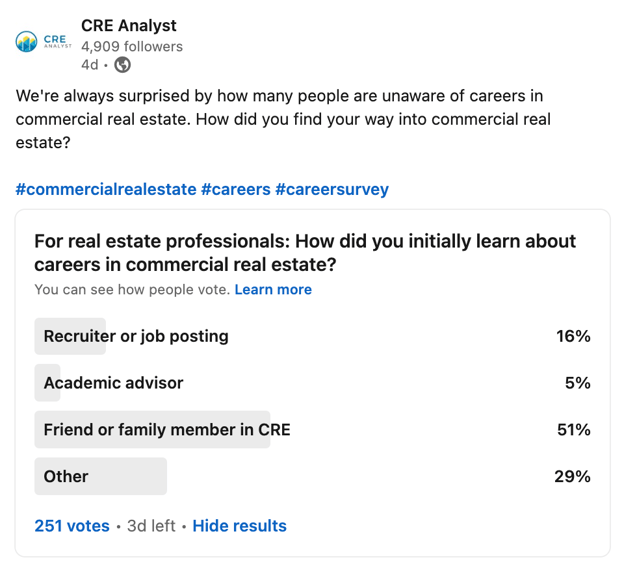
This almost certainly helps to explain why the industry is extremely homogenous, especially at the top where somewhere between 80% to 90% of senior roles are held by white men. Our point in highlighting this isn't that white men are bad. Our point is that the industry's narrow focus has meaningful consequences with respect to talent, capability, decision-making, and compensation.
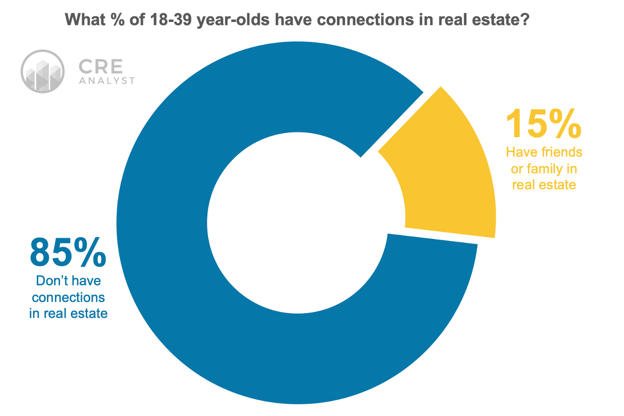
(iii) There's a game-changing amount of talent on the sidelines
Reginald Rawlins and Der'Rikk Thompson were the first students who signed up for the initial FastTrack course. They were both in educational software sales and took the class because they knew they needed real estate skills to break in. They are now both asset managers with MetLife Investment Management and Invesco US.
Shakiel Randolph played in the NFL for a few years before realizing a career in business would likely be a lot more rewarding over the long term. He leveraged an MBA and FastTrack to break into real estate and is an asset manager at Goldman Sachs.
Cameron Kramer was in sales and is now a leasing agent at HPI Real Estate Services & Investments. Victoria Jackson was an executive assistant before becoming an analyst at Stream Realty Partners.
Braddock Erickson and Wes Bochner were both Navy Seals. Braddock is now a development associate at Hillwood, and Wes is an investment sales associate at CBRE.
Every one of these FastTrack alumni is extraordinary, but we didn't meet them randomly. We simply started talking to people about FastTrack. Something like: "We created a class that exists purely to give you an opportunity to acquire some valuable skills." Then they showed up. And after they showed up, they blew us away. These alumni and their peers typically start at about 50% competency and complete our class with 85-90% competency.
Their performance got us wondering who else was out there and how extraordinary talent deserves an extraordinary path.
What is the underlying problem the Spark Fellowship is trying to solve?
We believe two prerequisites need to exist in order to make the real estate industry more accessible...
In every major real estate city, a small group of connected decision makers (10-30 people) wields disproportionate influence on the local industry. These leaders need to be the biggest advocates for making our industry more accessible. They have to be inspired by the idea of leaving the industry better off and be cheerleaders for new ways to recruit and train talent. Thankfully, our experience suggests that any narrative about an older real estate generation hogging the best opportunities is completely off base. We've been overwhelmed by how quickly these leaders (at least in Dallas) advanced the idea of the Spark Fellowship. 95%+ of our discussions with senior leaders suggest they are extremely aware of the problem and want to help. They just need paths that work.
The second prerequisite we need for the industry is to have candidates who are trained in CRE fundamentals, familiar with industry standards, and integrated into critical networks. Unlike the leadership prerequisite above, which currently exists, the industry consistently falls short when it comes to creating pathways that find and develop capable talent. The Spark Fellowship exists to solve this underlying challenge.
Our model is simple: Attract the right talent, train them well, give them high-quality and cross-functional work placements, earn employer buy-in, and provide a network of job placements. Our experience led us to believe this was the right combination to provide an unmatched launch pad for extremely promising talent from underrepresented backgrounds.
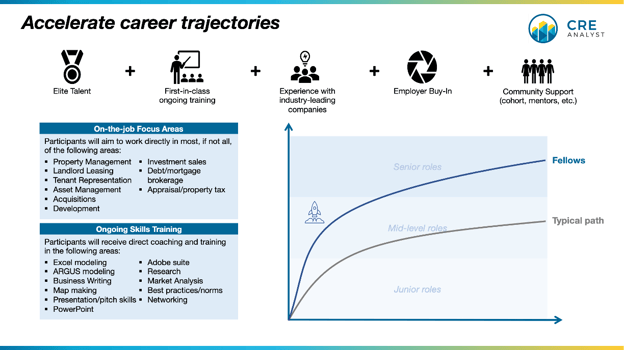
Early discussion material with Spark Fellowship partners
When we started sharing the concept with industry thought partners, we were blown away by their excitement about the idea. The following framework came together quickly for how we could all work together to create a flywheel for real estate talent.
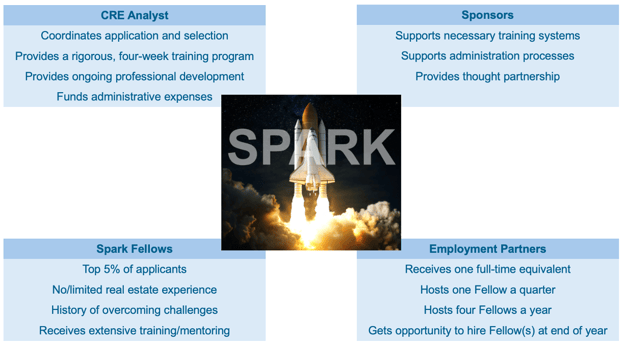
Supporters, sponsors, and partners
To our knowledge, nothing like this exists, so we had no test cases. And no one's day job included planning, running, or thinking up a fellowship, so pulling this off required a team who dedicated a lot of their free time. More generally, the amount of fortitude it takes for senior professionals to invest their reputation and capital (political and financial) in a program like this is hard to overstate.
Therefore, we want to call out a handful of the critical team members who made the Spark Fellowship a reality. In addition to simply shining an unsolicited light on them, we think these leaders send a very important message to hard-working, talented individuals with leadership potential: These leaders believe in you and are betting on you, regardless of where you come from.
- Stream Realty Partners was the first employment partner and hosts Fellows in Stream's Investment Management Division in Dallas.
- JLL, a leading intermediary and services firm, hosts Fellows in the firm's Dallas capital markets group.
- Nuveen, a TIAA company hosts Fellows in their industrial acquisitions and asset management group in Dallas, which oversees more than $30 billion of assets.
- TriGate Capital, LLC recently closed on a $500+ million value-add fund and hosts Fellows in the firm's Dallas headquarters.
- Cawley Partners develops and owns office buildings and hosts Fellows in the firm's Dallas headquarters.
- Altus Group is a leading provider of consulting and data services to real estate professionals and has been a critical partner with respect to training Fellows and other young professionals in Argus.
Every Fellow is now ARGUS Software Solutions certified. The Real Estate Council (TREC) is a unique trade organization, focused on improving Dallas and the local real estate community. Linda McMahon and Kim Butler were involved in the earliest Spark Fellowship brainstorming sessions, and the TREC Community Investors graciously awarded the Fellowship a $50K grant to partially offset recruiting and training costs.
CRE Analyst oversees and coordinates recruiting and training, and pledged $100K toward the costs of pulling together the program, which allows all employment sponsor contributions to go directly to the Fellowship.
The Spark Fellowship selection process
Applications: We received 98 applications for 5 available spots in the 2023 Spark Fellowship, which makes the Spark Fellowship (with a 5.1% acceptance rate) slightly less competitive than Harvard but more competitive than Brown, Columbia, Dartmouth, and Penn. We have a lot of work to do because we want to be able to accept every qualified candidate. Nevertheless, our review committee narrowed the 98 applications down to 17 finalists, who were invited to attend a 36-hour Super Day.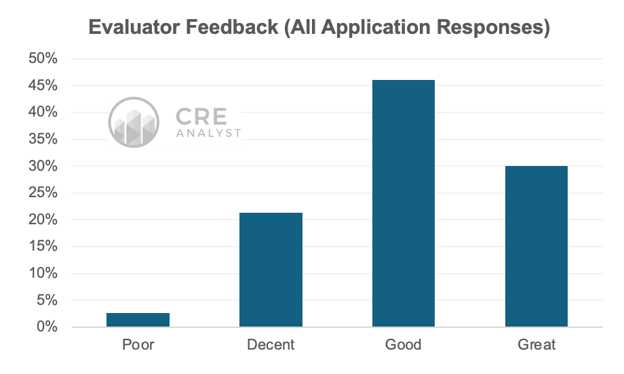
Every application was reviewed by multiple reviewers, and reviewers scored responses on a 1 to 4 scale.
Shadowing: Finalists shadowed industry professionals in half-day segments.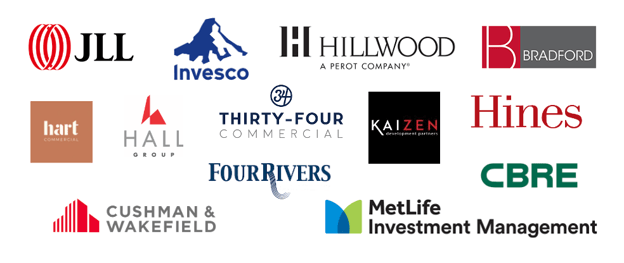
Shadowing mentors from these firms hosted half-day sessions with Fellowship finalists.
Networking happy hour: All finalists attended a networking happy hour with shadowing mentors and selection committee members.Mentoring dinner: Finalists attended small group dinners with industry leaders.
Formal interview: Interview panels asked every finalist the same questions and graded their responses in accordance with a rubric. Although this approach is formulaic, we believe it provides a relatively even bar and minimizes bias.
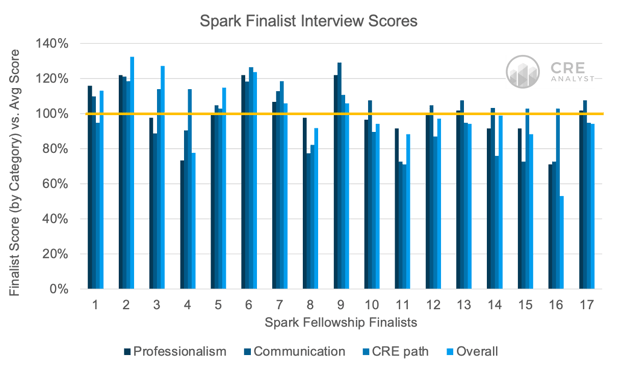
Finalist interview scores by topic.
Case study: Finalists completed a development case study and had an opportunity to discuss findings with a facilitator.Real estate assessment: Finalists completed a real estate assessment, which--although not a material part of the selection criteria--allowed for tailored training paths for Fellows.
Our evaluation process was intense but necessary and would not have come together without the individual contributions of dozens of reviewers, interviewers, shadowing mentors, dinner hosts, etc.
Chase Stone, Arthur Brousseau, Dylan Munoz, Kristi Leonard, Makenna Barbara, Wells Waller, Nate Eskinder, Kyle Patterson, Jenkins Bender, Zach Riebe, Tom Andrews, Holly Losey, Kristi (Torkildson) Waddell, Christine Nardecchia, Monica Luera, Jason Obenhaus, Dalton Stogner, Anna Butler, Ty Middlebrooks, Morgan O'Neil, Lauren Tarpley, Taylor Thomas, Carrie Halbrooks, Blake Jones, Brady Gayle, Jack Kemps, Luke Aviles, Tom Marshall, Will Daniell, Hunt Wood, Amanda Gadison, Ash Goldfarb, Bryce Jackson, Tess Marunich, MBA, Steve Modory, Craig Wilson, Lindsay Wilson, Greg Kraus, Chris Schmidt, Georga Rowe, Jack Campbell, Allison Johnston Frizzo, Ashley Winchester Curry, Brian Mullen, Bryce Jackson, Corbin Eckel, Cynthia Cowen, Eliza Bachhuber, Jim Curtin, Karch Schreiner, Lee White, Mike Senia, Richmond Collinsworth, James Ray, Richard Byrd.

COMMENTS